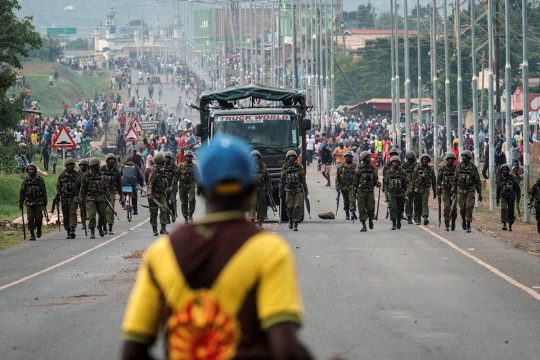Security agencies are killing and abducting men in north-east Kenya who they suspect of links to Islamist extremists, a rights group said Wednesday.
Human Rights Watch (HRW) documented 34 "enforced disappearances" and 11 suspected "extrajudicial killings" over two years in Garissa, Mandera and Wajir counties as part of counterterrorism operations in Kenya's predominately ethnic Somali north-east.
"People in northeastern Kenya deserve protection from Al-Shabaab attacks, not further abuse from the authorities," said HRW executive director Ken Roth, adding the cases documented were "just the tip of the iceberg."
The report details people taken from their homes by masked, armed men who did not identify themselves, or beaten in the streets, before being driven away in government vehicles.
Some of the disappeared were last seen in police or military custody. None has been charged with any crime, nor are their families able to trace them.
"Rounding people up and refusing to disclose their whereabouts is a serious crime and only compounds fears and mistrust in the security forces," Roth said.
Kenya's Anti-Terrorism Police Unit (ATPU) is regularly accused of intimidating or killing, rather than arresting, suspects with both human rights and academic researchers repeatedly warning that the heavy-handed approach alienates and angers communities, helping drive radicalisation.
Those warnings have been ignored, HRW says, with a range of security agencies employing the same tactics in north-east Kenya under the legal authority of Kenya's National Security Council, headed by the president and other senior officials.
Security agencies deployed in Kenya's north-east include national police and reservists, another police branch called the Administration Police, the ATPU, National Intelligence Service, Directorate of Military Intelligence, the army and even the Kenya Wildlife Service (KWS).
All are implicated in the alleged murders and abductions of mostly ethnic Somali men in their 20s-40s.
"This is multi-agency abuse, with a sophisticated operational structure that reaches to the highest levels of government," Roth said.
The report also points the finger at Kenya's new National Counter Terrorism Centre (NCTC) established to coordinate the country's counterterrorism operations and donors including the European Union, United States and Britain which support Kenya's security forces.
Since sending troops into Somalia in 2011, Kenya has suffered numerous terrorist attacks by the Somali-led al-Qaeda group, the Shabaab, including an assault on Nairobi's Westgate shopping mall in 2013 and a massacre of students at a university in Garissa in 2015.
The only Kenyan government agency to respond to the allegations was KWS which said it was "not aware" of any disappearances.



